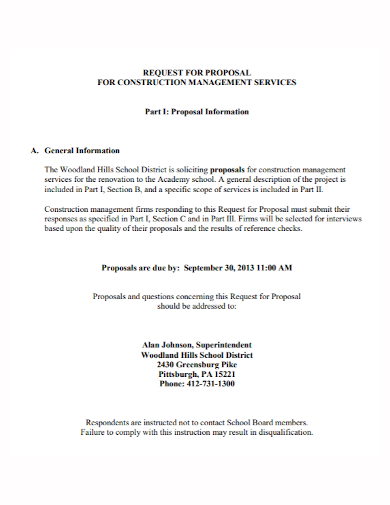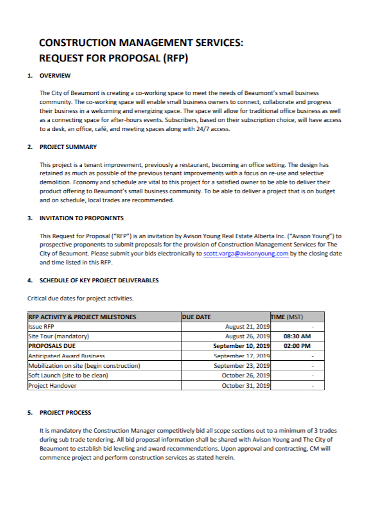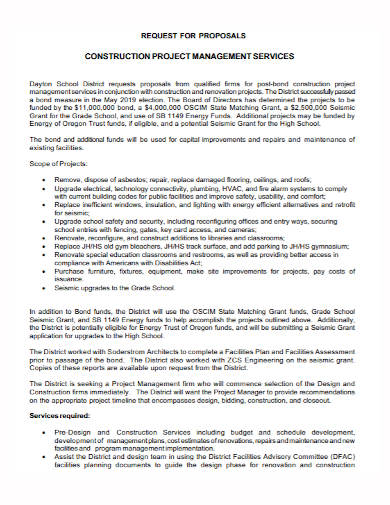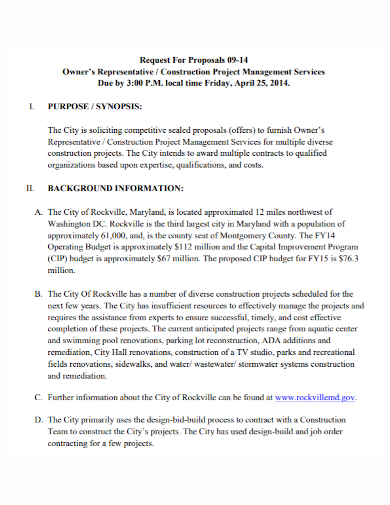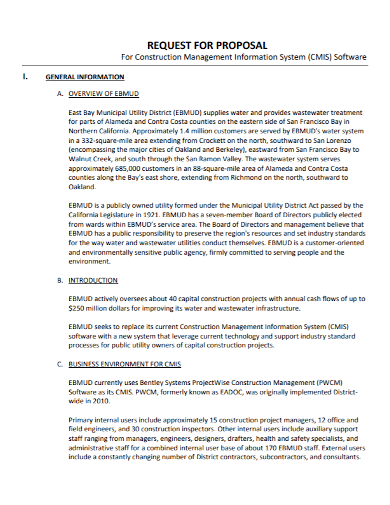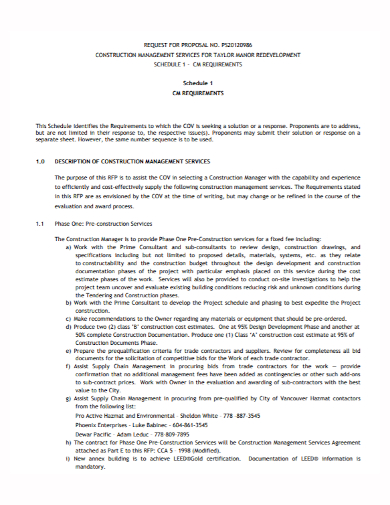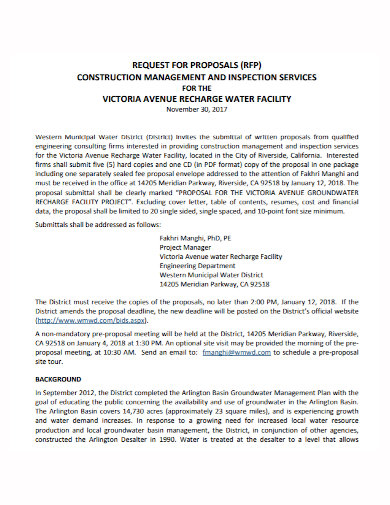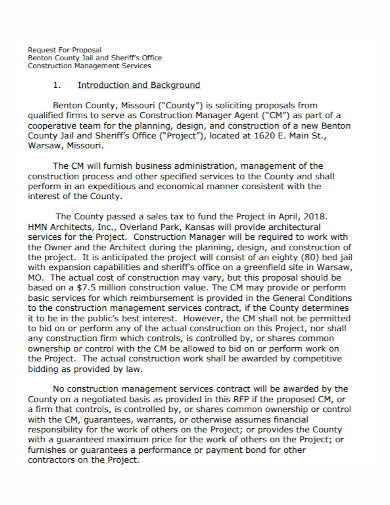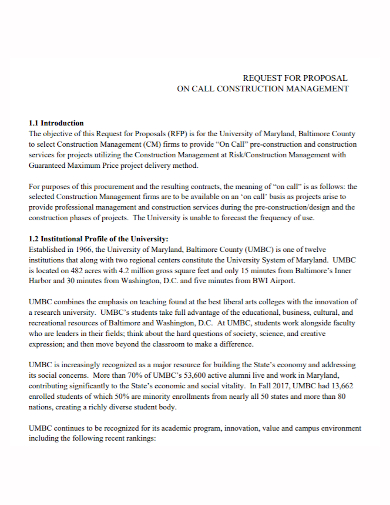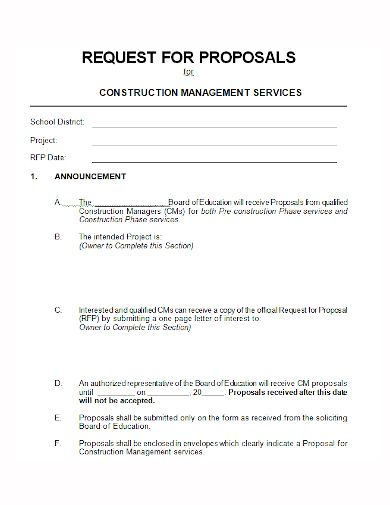Whether it’s a shopping mall or a single-family home, construction projects are highly structured endeavors. They have a lot of moving parts and people who need to be coordinated perfectly. Construction project management, like any other project, has phases that range from design to planning to schedule to the actual construction. Each of these phases is difficult enough on its own, but when combined with the rest of the project, they become exponentially more difficult.
10+ Construction Management Proposal Samples
Construction management is a professional service that ensures that a project’s schedule, cost, quality, safety, scope, and function are all managed effectively by the project’s owner(s). All project delivery methods are compatible with construction management. A Construction Manager‘s (CM) responsibility is to the owner and to a successful project, regardless of the setting. The CM represents the owner’s interests and oversees the entire project on the owner’s behalf. His/her mission is to collaborate with all stakeholders to complete the project on time, on budget, and to the owner’s expectations for quality, scope, and function.
1. Construction Management Proposal Template
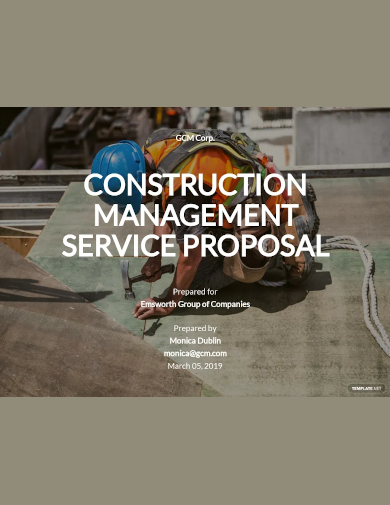
2. Construction Management Services Proposal
3. Construction Management Request for Proposal
4. Construction Project Management Proposal
5. Representative Construction Management Proposal
6. Construction Management System Proposal
7. Construction Management Development Proposal
8. Construction Management Inspection Proposal
9. Construction Management Office Proposal
10. Call for Construction Management Proposal
11. School Construction Management Proposal
Construction Sectors
Depending on the construction sector, there are a variety of different types of construction projects. Residential and commercial construction are the two types of construction. There are up to four different types of projects depending on the industry:
- Construction and renovation of residential dwellings
- Construction of heavy industrial equipment
- Construction of commercial and institutional buildings
- Construction engineering
As a result, there is a wide range of construction projects that require construction management to be successful. From engineering a dam to an airport seismic retrofit project, construction management may be required for anything from a simple home to a large bridge. Construction project managers, on the other hand, oversee the start and finish of a project’s construction, often managing on-site to ensure a safe and successful outcome.
There are many different types of construction projects, each with its own set of challenges. All of them, however, require a project owner, construction project manager, and general contractor.
Construction Project Management Processes
To take a project from concept to completion, construction project management necessitates a wide range of abilities, as well as the ability to communicate with a wide range of agencies and people. Construction project managers must adhere to project management principles at all times throughout the project life cycle.
- Project initiation – You can’t begin a project unless you’re confident that you’ll be able to complete it. The first step is to conduct due diligence to see if the project is even feasible. What method do you use to figure this out? You should conduct a feasibility study, also known as a business case, in which you examine the project’s goals, cost estimates, and timeline to see if you have the resources to complete the project successfully within those constraints. You should also define the project’s rationale and ensure that it is sound. If that’s the case, you’ll need to create a project charter to get things started. In this phase, you’ll also identify potential issues and risks.
- Project planning – Now that you’ve received approval, how are you going to achieve success? Outline the tasks within the timeline, taking note of project milestones and the resources required to complete those tasks within the budget constraints. Make your project plan transparent so that everyone is on the same page and understands what needs to be done throughout the project’s life cycle. This includes information on the project’s cost, scope, duration, quality, and communications. This is also the time when you’ll be able to envision the best project team for the job and start putting it together.
- Project execution – Now you’re in charge of executing the project, which entails taking the project plan and putting it into action, as well as dealing with any changes and work management issues that may arise. Whatever deliverables you promised must be delivered within the specified timeframe. You must now deal with the project owner, stakeholders, customers, and teams as a construction project manager. Tasks must be completed by the latter, which necessitates workload management and resource allocation. Throughout this stage, you’ll be scheduling meetings and reporting on a regular basis. Your project management tool will be put to the ultimate test here, but more on that later.
- Project monitoring and control – If you don’t have a way to track your project’s progress, you won’t know how far it’s progressed. You’ll be doing this during the project’s earlier stages, but it’s significant enough to warrant its own stage in your management. You’ll need a way to keep track of your progress, which is why you’ll need to create key performance indicators for cost control, time tracking, and quality assurance.
FAQs
What is construction project management?
While project management is generally defined as managing resources over the course of a project’s life cycle using various tools and methodologies to control scope, cost, time, quality, and so on, working in the construction industry necessitates a broader perspective. Construction management typically involves a broader range of constraints that are unique to the design and construction of construction projects.
What are the three parties in a capital project?
- The project’s owner, who commissions the work and either funds it directly or through a variety of methods.
- The architect/engineer who is in charge of the project’s design.
- The general contractor is in charge of day-to-day operations and subcontractor management.
What is the work of a general contractor?
A general contractor supervises the job site’s daily operations and provides the necessary equipment, materials, and labor for the project’s execution phase. Subcontractors are usually hired by general contractors to complete specific tasks.
If you want to see more samples and formats, check out some construction management proposal samples and templates provided in the article for your reference.
Related Posts
Title Project Proposal Samples [ Community, School, Student ]
FREE 10+ Product Supply Proposal Samples in MS Word | Google Docs | Apple Pages | PDF
FREE 10+ Health Project Proposal Samples [ Public, Mental, Healthcare ]
FREE 11+ Engineering Project Proposal Samples in PDF | MS Word
FREE 4+ Racing Sponsorship Proposal Samples [ Team, Car, Driver ]
FREE 10+ Nursing Project Proposal Samples [ Community, Health, Clinical ]
FREE 11+ Student Council Proposal Samples in PDF | DOC
FREE 10+ Facilities Management Proposal Samples in MS Word | Google Docs | Apple Pages | PDF
FREE 8+ Joint Venture Proposal Samples [ Commercial, Real Estate, Construction ]
FREE 10+ Scholarship Proposal Samples [ Project, Grant, Sponsorship ]
FREE 10+ Computer Purchase Proposal Samples in MS Word | Google Docs | Apple Pages | PDF
FREE 10+ Network Project Proposal Samples [ Design, Security, Bank ]
FREE 14+ Accounting Proposal Samples in PDF | MS Word
FREE 10+ Church Event Proposal Samples in MS Word | Google Docs | Apple Pages | PDF
FREE 10+ History Proposal Samples [ Dissertation, Thesis, Paper ]

